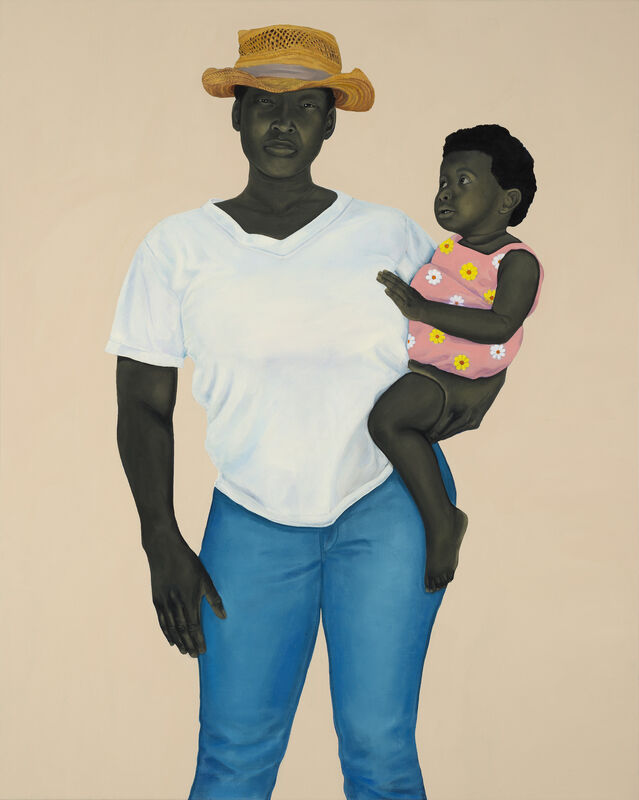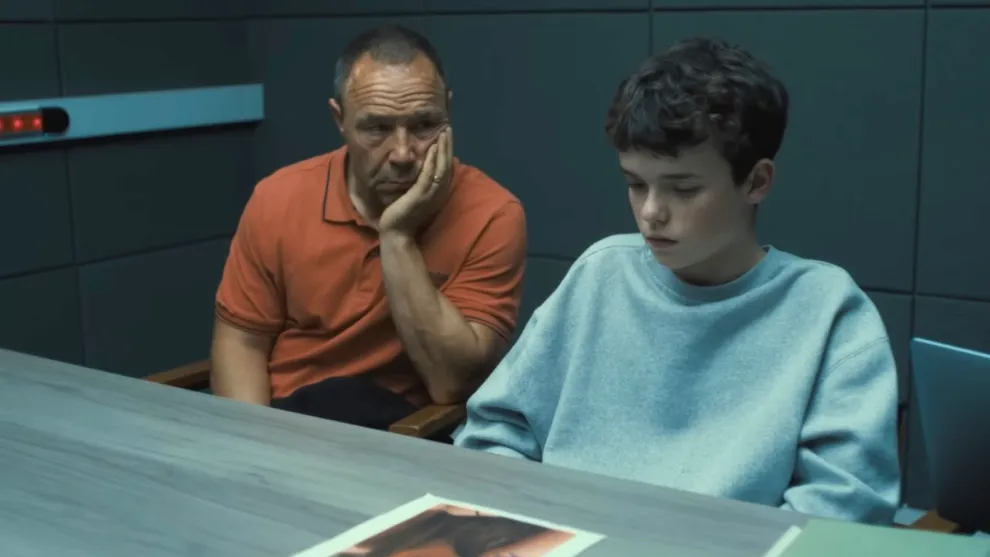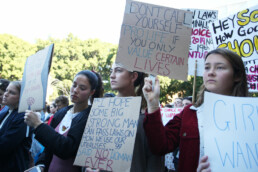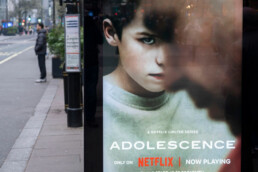The Wonder of Amy Sherald
Ordinary Black life is extraordinary in the artist’s first major mid-career museum survey.
By Rebecca Carroll
Last month, The New Yorker featured a breathtaking portrait on its cover by celebrated Black American artist Amy Sherald. First painted in 2014 and titled “Miss Everything (Unsuppressed Deliverance),” the portrait of a young Black woman wearing a bright red hat is the same piece Sherald later submitted in a competition at the National Portrait Gallery. She won the competition, which caught the attention of former First Lady Michelle Obama, who then personally chose Sherald to paint her portrait for the National Portrait Gallery—making the Georgia native the first Black woman artist to be selected for an official presidential portrait. The Obama painting changed the entire trajectory of Sherald’s career, and since then her figurative grayscale portraits have been shown in public and private collections around the world.
Now, Sherald is having her first major museum survey at The Whitney Museum of American Art, called American Sublime, a title borrowed from the poet Elizabeth Alexander’s book of the same name. I’ve known and admired Sherald for years, and I was thrilled to sit down with her to talk about her work in this truly transcendent exhibition.

Rebecca Carroll: The last time we saw each other in person was pre-Michelle Obama portrait, when we randomly ran into each other on the street in Brooklyn. And here we are today to discuss your first solo exhibition at The Whitney. How are you feeling?
Amy Sherald: I told a friend last week, “I don’t know, I just feel emotional.” And she’s like, “Well, you’re getting used to belonging to the world, and not just to yourself.” Hearing that made me want to cry, and I left her a voice text, and said, “Okay, I’m sitting here holding back tears because I am a thug and I do not like to cry. But that’s exactly what I feel like.”
It’s a lot! The show is also set against a backdrop of political turmoil in America, particularly in regards to race, and actually not dissimilar to what we were experiencing when we last saw each other. At that time, the height of Black Lives Matter, I had written a piece for the LA Times, saying “Even as we see images of what most of us already know, that police violence against Black people in America is occurring with vicious regularity, something remarkable is materializing in its wake. We are also bearing witness to a pronounced moment of Black cultural ascension.” How has your work been impacted by eras of Black cultural ascension versus centuries of Black oppression?
My work was essentially born out of the desire to free myself from a history of oppression, but also in celebration of these eras of enlightenment. What I want the viewer to experience, and I say this in the exhibition [statement], is “the wonder of what it is to be a Black person.” I’m no longer religious, but I speak about this in that language of flesh and spirit—because part of us always has to be activated [in fighting oppression].
Right, exactly. I know you consider yourself as much a storyteller as an artist. As Black storytellers, I feel like we never make anything without parts of each other within us—intergenerationally, ancestrally, futuristically. But when the work goes out into the world and starts to belong to non-Black people, I sometimes feel these waves of protectiveness about it. Do you ever feel that way about your work?
I want the work to belong in the world because it was the only way that I could figure out how to counter whiteness, and the way that everything is saturated with it, comes from it, and evolves around it. My response to that is to make something that’s just as universal, and that can be consumed in the same way, because then [white people] are going to be consuming it in the same way that I had to consume Barbie, and all of these other things.
A pointed example for me was when your portrait of Breonna Taylor was on the cover of Vanity Fair, and it felt so unjust to me that suddenly white people were allowed to look at her in this way that we had seen her all along. Did you feel any conflict about that specific piece?
I didn’t, because of how it started. It started with Ta-Nehisi [Coates], and I trusted him and his vision. Maybe if the call had come from somebody else, then yes, but because it was Ta-Nehisi, no.

To clarify for our readers, Coates was the guest editor for that particular issue of Vanity Fair, and so that makes a difference, for sure. Now that the portrait is part of this exhibition at The Whitney, what has been the broader response to it?
A lot of people, of all races, are moved to tears by it. After I first finished it, I was really just thinking about how I’ve made this portrait, we’ve photographed it, it’s been on the cover of Vanity Fair, and now it’s in my studio. Now what can it do? I started some conversations, and it ended up being acquired by the National Museum of African American History and Culture. And now there’s a Breonna Taylor Legacy Fellowship and Breonna Taylor Legacy Scholarships for undergraduate students and law school students [at the University of Louisville, in Louisville, Kentucky, where Taylor lived; the fellowships are funded by proceeds from the portrait’s sale]. So if a student is doing anything in regards to social justice, whether their major is political science or art, they have an opportunity to get this scholarship. And then if a student is in law school and wants to work expungement [when a criminal record is erased or made unavailable for public access] cases in Alabama, which pays nothing, then here’s $12,000 to get you through your summer.
Does the idea that Black artists do work for each other resonate with you?
I feel like we make what we make because we are who we are. My mom told me this story about myself, and it stuck with me because I think my work sits in the world in the same way. [When I was a child] sometimes when we had dinner, I would just randomly get up and walk around the table and touch everybody on their shoulder and say, “I love you.” I would go all the way around, and then come sit down and finish my dinner. I think these portraits are “I love yous” out in the world to affirm anybody who is willing to see past the exterior and go deeper into their experience of what it means to be a human.
I love that story. And what do you experience when you look at your work?
I feel like the work sits in The Whitney, and there are words on the wall that explain it, but that work is me—somebody who was once a people pleaser and had a problem saying no, someone who doesn't like conflict or confrontation. My personality made that work.
I would never have looked at your work and thought, “These pieces were made by someone who had a problem saying no.” Are there specific things in the pieces that signal that to you?
I guess that’s where the beauty comes from, because the work doesn’t yell at you. It speaks to you nicely. If you feel uncomfortable in the presence of a Black person, this work will make you think, “Okay, well, maybe I don’t need to grab my purse. I might feel safe in the elevator with this guy.” It speaks to people that way. I went to Catholic school from K through 12, and was always one of two or three Black kids, so I have a lot of patience. I learned a lot of, “Let me explain to you why you can't say that.” Versus my friends that went to all-Black high schools, where it’s just like [gestures taking her earrings off], “Let me tell you…”
But you feel differently now, right? You’re in a different place. How do you think that will affect your work moving forward?
I’m not sure how the work is going to evolve to match who I am now, which is somebody who’s stronger, who doesn't mind saying no, and will look at you while you feel uncomfortable with my answer. I am excited because everything that I’ve made in this show has been living in my head for 20 years.
Does it feel like a kind of excavation in that way?
It feels more like a birth than an excavation. When I think about Black American art history and just our legacy within the larger canon, I feel like we don’t or can’t function on the same timeline as everybody else. It still feels like the beginning of something, this moment of myself, Rashid Johnson, Lorna Simpson, and Jack Whitten [all currently having museum shows]. It feels really great despite everything that’s happening. The art world is representing the world that we want to be—the real world right now.

What happens next for you?
I’m hoping that this show will make it into the National Portrait Gallery without having to make any compromises based on who’s sitting in an office at the White House. And I don’t mean, “Well, if I can’t have this painting of two men kissing and a trans person, then I’m not going to do the show.” I feel like that would be a mistake. I feel like it’s a mistake to step down from boards just because [Trump] wants to take over the Kennedy Center. Now more than ever, I feel like it’s important we be in those rooms and not shutting down the conversation. I think the bigger moment would be the work being in the Smithsonian Institution and people coming there to look at American history and Presidents, and then walking into my exhibition.
Whatever the fate of the work in this show, one of the things that really came through as I was walking through the exhibit, just like the way you used to walk around your family’s dinner table and tell everybody you love them—all of these people are taking care of each other, and I felt tapped on the shoulder and loved by every one of them.
Exactly as you should have felt.
Why Is Consent Controversial?
 April 24, 2025 Howdy, Meteor readers, I know everyone is talking about Sinners, but I am what you would call a certified scaredy-cat; I still suffer from Scream. But a bunch of fellow scaredies online say it’s not too bad if you watch it during the day so I’ll see y’all at the afternoon matinee.  In today’s newsletter, we investigate sex miseducation in Indiana. Plus, Nona Willis Aronowitz remembers her “feminist fairy godmother.” Meow, Shannon Melero  WHAT'S GOING ONVirginity education: Yesterday, Indiana’s House and Senate voted in favor of SB 442, titled “Instruction on Human Sexuality.” You might have heard of it (on our Instagram feed and elsewhere) because of a debate over whether that “instruction” should include the idea of consent. The bill’s author, Sen. Gary Byrne (R-IN), had removed a requirement that teachers address consent earlier this week, arguing that the subject could be seen as “controversial.” (Research from the Indiana Department of Health shows that 56 percent of sexually active high schoolers had experienced some form of sexual violence, with 11th grade girls making up most of that group.) After public outcry, though, the consent requirement was re-added to the bill yesterday—your latest reminder that yelling works. But here’s the thing: The bill is still light on the education part of sex education. In addition to consent, it requires sex-ed classes in Indiana to teach four things: abstinence, abstinence (yes it’s listed twice), instruction that the best way to avoid STIs is a “mutually faithful monogamous relationship in the context of marriage” (we remind you, these are children and teens), and the viewing of a high-definition ultrasound video, at least three minutes long, depicting the development of organs in a fetus. It’s giving Catholic-school health class, and I would know, as someone whose sex-ed was having to watch the movie Riding in Cars with Boys. Let’s linger on the video for a second. These kinds of videos—most notably the notorious “Baby Olivia”—have cropped up over the last two years as a tool of the anti-abortion movement and are more often than not, medically inaccurate and meant to elicit an emotional response rather than be strictly educational. When pressed about the video requirements by Democratic senators yesterday, Byrne insisted he was not specifically suggesting “Baby Olivia,” IndyStar reported, and that school boards would be able to choose which films get shown to students. “There’s plenty of examples of videos,” he argued. (When pressed to name them, he could not.) Indiana is, of course, not the first state to introduce such narrow requirements for sex-ed classes or to inject what sound like conservative Christian views of sex into a secular public school system. Currently, 37 states have laws that require abstinence as part of sex education, while only 18 require teachers to share information about birth control. As far as education around consent? Only 12 states—13 if the Indiana bill passes—require that it be mentioned. But studies show that simply telling teenagers not to have sex doesn’t protect them from STIs or unwanted pregnancies. What does work, according to the Sexuality Information and Education Council of the United States, is comprehensive education that includes consent, contraception, STI prevention, and sexual health for LGBTQ+ communities. AND:
 OBAMA AT A LIVE TAPING FOR HER PODCAST, "IMO." IN HER LEFT HAND, SHE CAN BE SEEN HOLDING ALL OF HER DESIRE TO CONTINUE BEING A PEOPLE PLEASER. (VIA GETTY IMAGES)
 DURBIN IN 1994. (VIA GETTY IMAGES)  WEEKEND READING 📚Online: When we said we wanted a “womanosphere” this is not what we meant. (The Guardian) On history repeating itself: Historian Greg Grandin explores Latin America’s journey from “fighting to facilitating fascism.” (Democracy Now) On mixtapes: Have a cry with writer Jill Mapes, her dad, and a shared appreciation for good music. (Hearing Things)  FOLLOW THE METEOR Thank you for reading The Meteor! Got this from a friend?
|
![]()
You Can't Pay Us to Have More Kids
 April 22, 2025 Greetings, Meteor readers, It’s Earth Day! And also, it’s Taurus season! May we all feel some stabilizing, comforting energy over the next few weeks because boy, do we need it. In today’s newsletter, Nona Willis Aronowitz explains what’s behind the administration’s “make more babies” plan. Plus, we bid farewell to the pope. Bulls up, Shannon Melero  WHAT'S GOING ONBaby bust: Yesterday, the New York Times reported that the pro-natalist Trump administration, concerned about the U.S.’s falling birth rate, has been brainstorming ways to get American women to have more children. Some of their ideas include five-thousand-dollar baby bonuses, menstrual-cycle education, and a National Medal of Motherhood (a tactic you might recognize from the Nazis). Notably missing: plans to subsidize childcare, parental leave, or any other crucial improvements actual families have been requesting for generations. Lots of incredulous reactions across the internet made that exact point: “How can you expect us to have more babies without a strong social safety net?” As someone who yearns for free daycare and paid maternity leave, I’m tempted to say the same. Yes, it’s darkly ironic that the Trump administration is calling for more babies even as it has made deep cuts to maternal and child health and opposed any repair of the U.S.’s woefully inadequate family policies. But the thing is, offering benefits to families doesn’t actually boost birth rates. In fact, many countries that provide robust support for parents, like Finland, Norway, and Germany, have birth rates below ours. There’s no evidence that Trump’s proposed policies would work, either. “Even the richest, savviest, most committed governments” are stumped, a history professor told Vox in 2023. “If such policies were discoverable, I think someone would have discovered them.” So the question you’re probably wondering is: What’s so bad about the birth rate falling? Most countries in the world are now below the “replacement rate” of 2.1, and the trend is most pronounced in the richest nations; the United States is at about 1.6, a drop of more than 20 percent in the last decade. Seen one way, fewer babies is a success story of women truly having control over their own lives, and—thanks to contraception access, education, and career opportunities—being able to make choices that may or may not involve children. Maybe those decisions “shouldn’t scare us,” writes feminist writer Jill Filipovic, “but should inform us that when women have more options and opportunities, women’s desires become far more varied.” Still, experts across the political spectrum agree that a shrinking population with more old people than young presents huge economic and humanitarian challenges. An aging society means fewer workers to keep society functioning—to grow our food, to build our houses, to care for the elderly. For many, the story of South Korea, which has the lowest birth rate in the world, provides a disconcerting glimpse of what happens when so few babies are born: 1 in 5 people in South Korea are over 65, and nearly 40 percent of those elders live in poverty. But no matter how valid these concerns are, Trump’s “solutions” are both demeaning (ugh, that medal) and historically familiar: The one way governments have temporarily bumped up birth rates throughout history is by oppressing women. Think Nazi Germany and its Lebensborn program, which used women as incubators for 20,000 “Aryan” babies. Or Ceausescu's Romania, which severely restricted abortion and birth control access to devastating effect. Even our own “baby boom” in the repressive 1950s partially relied on pushing women into domesticity. This brand of pro-natalism—promoted by people like J.D. Vance, Tucker Carlson, and Elon Musk—often goes hand-in-hand with racism and anti-immigrant sentiment. While immigration is often touted as a short-term solution to the U.S.’s low birth rate, the Trump administration’s cocktail of natalism and xenophobia makes clear that they don’t want more babies of all kinds, just white, Christian babies in heterosexual nuclear families. So, yes, I agree that we should seriously grapple with how to reshape society in the face of population decline. I just don’t trust this administration—with its blatant disregard for families and basic human decency—to do it. —Nona Willis Aronowitz AND:
 POPE FRANCIS DELIVERED HIS FINAL EASTER SERMON AT THE VATICAN THE DAY BEFORE HE DIED. VIA GETTY IMAGES
 COLUMBIA STUDENTS AND ALUMNI CHAINED THEMSELVES TO THE UNIVERSITY'S MAIN GATE LAST WEEK TO PROTEST THE DETENTION OF STUDENTS. (VIA GETTY IMAGES)
 FOLLOW THE METEOR Thank you for reading The Meteor! Got this from a friend?
|
![]()
The New Binge Drinkers
 April 17, 2025 Dearest Meteor readers, I’m feeling tender this week and I’m gonna blame Dying For Sex, the new FX miniseries about actual death, the little death, and ride-or-die friendship. The final episode had me in a puddle the other day. Highly rec’d if you’re a fan of Michelle Williams and/or catharsis.  Today, we dig into a surprising new statistic about young women and drinking. Plus, affirmative action for white men and justice for Black mothers. Still sniffling, Nona Willis Aronowitz  WHAT'S GOING ONA sobering new study: If your image of a young binge-drinker is a frat boy doing keg stands, you’re out of date, according to a new analysis in the Journal of the American Medical Association. While drinking among young people is declining overall and older women still drink less than older men, women ages 18 to 25 now binge-drink slightly more than their male counterparts. (Binge-drinking is defined as regularly having more than four drinks in one sitting for women and more than five drinks for men; the study compared data from the National Survey on Drug Use and Health between 2017-2019 and 2021-2023.) Women’s drinking habits have been catching up to men’s for decades, and scholars, journalists, and public health advocates have been noting the results: Women are increasingly dying, getting sick, and going to the ER from drinking. And why are we drinking more? It’s partly because of stress. (Research indeed shows that women are more likely to drink in order to cope than men. See also: “Mommy wine culture.”) The pandemic seems to have compounded the problem; articles and studies have abounded since 2020 showing how much more women were drinking to get through their days. Women, some have concluded, “need an intervention.” (Others, as one Meteor commenter put it a few months back, are “tired of being targeted for all the things.”) But what accounts for younger women binge-drinking more than younger men? The study was careful not to draw conclusions; the authors say that because the groups analyzed in each time period are not the same people, they don’t know whether we’re seeing an actual rise among young women or, perhaps, a decline among men. But Susan Stewart, a professor of sociology at Iowa State University who studies alcohol use among women, has an initial hypothesis: “I think it has to do with women’s independence,” she says. “Young people are dating and having sex at lower rates, and less interested in serious relationships. Women are doing their own thing, which includes partying.” Stewart also points out that young women have higher rates of college completion than men, and college students binge-drink more than their non-college peers. It’s too early to tell whether this will be a longterm trend, Stewart says, but it could just be a side effect of an otherwise encouraging phenomenon: “women exercising a greater latitude of freedom.” In any case, it doesn’t hurt to familiarize yourself with the most recent health guidelines on drinking. And yes, alcohol can be a source of great pleasure—but in case you are struggling, there’s help to be had. AND:
 THE TRANS RIGHTS MOVEMENT IN SCOTLAND HAS BEEN FIGHTING FOR YEARS. VIA GETTY IMAGES
 WEEKEND READING 📚On the bigger picture: The CEO of the Society for Women’s Health Research breaks down exactly how Trump-era NIH cuts will affect women’s health. (XX Factor) On the man at the center of a crisis: Here’s what to know about Kilmar Ábrego García, the Maryland man unjustly trapped in a notorious prison in El Salvador. (The Guardian) On playing the game: Fox Sports host Joy Taylor talks to Irin Carmon about work, beauty, and those sexual harassment lawsuits. (The Cut)  FOLLOW THE METEOR Thank you for reading The Meteor! Got this from a friend?
|
![]()
The Secret War on Birth Control
 April 15, 2025 Hello, sweet Meteor readers, Happy Tax Day! This year I learned about the Child and Dependent Care Tax Credit, which sounded heavenly given that my family spent fully $15,000 on daycare last year. Imagine my disappointment when I found out that the maximum credit you can claim is 20% of $3,000…i.e. $600. Womp womp. (And Republicans have contemplated dropping even this piddling credit.) The state of childcare in this country is enraging. Today, we’re tracking the sneaky, scary erosion of birth control rights in America. Plus, Harvey Weinstein is back in court, and the “broligarchy” gets a dressing-down. Nona Willis Aronowitz  WHAT'S GOING ONThe secret war on birth control: From the moment the high court overturned Roe v. Wade in 2022, one Supreme Court justice signaled that birth control access was in danger. In a concurring opinion back then, Justice Clarence Thomas urged the court to re-examine “demonstrably erroneous decisions” like Griswold v. Connecticut, the 1965 ruling which granted Americans a constitutional right to birth control. So what’s happened to birth control since that fateful ruling? Last week, the National Women’s Law Center released a report addressing that question, and it finds that our right to contraception is indeed eroding. Since 2022, some lawmakers have wasted no time proposing or musing about bans on some forms of birth control; a nominee for Michigan attorney general compared emergency contraception to fentanyl. But there’s one big obstacle in their way: Birth control is incredibly popular. Upward of 90% of Americans believe it should be legal. So policymakers have turned to less obvious tactics to restrict contraception.  BIRTH CONTROL PILLS SHOULD BE AS CONTROVERSIAL AS DANGLY EARRINGS. VIA GETTY IMAGESLawmakers “know that they can’t attack birth control publicly or on paper, so they’re doing it secretly,” said Kimi Chernoby, senior counsel for reproductive rights and health at the National Women’s Law Center and the primary author of the report. Chernoby pointed to an innocuous-sounding bill called the Medical Ethics Defense Act, passed just last week in the Tennessee Senate that has a good chance of passing the House, given that a subcommittee already approved it. Not once does it mention birth control. But the legislator who sponsored the bill later said in an interview that the law would allow pharmacists to refuse to fill prescriptions for birth control. This sneakiness can reach the point of absurdity: Texas senator Bryan Hughes, the guy who crafted the state’s abortion ban, just presented a bill that would test wastewater for abortion medication and hormones found in birth control, because of the supposed health risk it poses “especially for pregnant women and children.” Oh, the irony. And to avoid political blowback, birth control opponents are also going after people on the margins, namely teens (by introducing parental consent laws for birth control) and low-income people (by restricting Title X and Medicaid recipients’ access to contraception). It’s a strategy the report calls “the anti-abortion playbook” because it mirrors anti-abortion activists’ journey from Roe to Dobbs: Start by targeting people who hold less political clout, and inch toward the mainstream from there. They’re also focusing on certain kinds of birth control like emergency contraception, which has been endlessly (and erroneously) attacked by rightwing lawmakers and institutions as a form of abortion, despite the FDA’s explicit clarification in 2022. “Some people are making a conscious decision not to listen to science,” Chernoby said.  CONGRESS TRYING (AND FAILING) TO PROTECT THE RIGHT TO CONTRACEPTION IN 2022. VIA GETTY IMAGESSo what can you do? Since this erosion is mostly on the local and state level for now, Chernoby suggests reaching out to state legislators urging them to codify protections to birth control, which a handful of states have done in the wake of Roe’s fall (and Thomas’ warning). Be sure to call your representatives if you live in Alabama, Arizona, Florida, Georgia, Iowa, Louisiana, Mississippi, North Carolina, Tennessee, and Wisconsin—all states that have blocked attempts to pass a Right to Contraception Act in the past. And if lawmakers don’t listen, make your outrage known. Chernoby said that when these issues get widespread coverage, restrictions often get reversed. For instance, in 2023, Iowa’s attorney general paused payments to hundreds of sexual assault victims for the emergency contraceptive Plan B. But she backed down after an outcry from Democrats and reproductive rights advocates, who pointed out that paying for pregnancy prevention should be the last thing survivors have to worry about. “When these attacks start happening more in the open,” Chernoby said (and she thinks they eventually will), “I predict there will be a lot of resistance.” Let’s make sure she’s right. AND:

  FOLLOW THE METEOR Thank you for reading The Meteor! Got this from a friend?
|
![]()
Death By 10,000 Layoffs
  April 8, 2025 Greetings, Meteor readers, Congratulations to newly crowned NCAA champions the Florida Gators and UConn Huskies. But more importantly, congratulations to me for winning my first bracket pool ever! It only took three years 🥴. In today’s newsletter, we look at the woman-specific impact of layoffs at the Department of Health and Human Services. Plus, we’re all still thinking about The White Lotus. Shannon Melero 🏆  WHAT'S GOING ONDeath by (ten) thousand layoffs: Last week the Trump administration decimated the Department of Health and Human Services; in the words of one former employee, “shitshow is an understatement.” As a result, the organizations housed under HHS—the Center for Disease Control, National Institutes of Health, Food and Drug Administration, and the Centers for Medicare and Medicaid— lost 10,000 staff members, effectively shuttering a number of departments. But not just any departments; the cuts will roll back decades of hard-won progress on women’s health research. Just take a look at what we’ve lost: Most of the CDC’s Division of Reproductive Health was laid off, including the team responsible for updating contraception guidelines and groups researching IVF and fertility clinics’ success rates (despite Trump’s promises to make the procedure more accessible). Three of the four branches of the Division of Violence Prevention were also eliminated. The division, established three decades ago, was crucial to framing violence as a public health problem, and yet last week, on the first day of Sexual Assault Awareness Month, all of the staff working on intimate partner violence prevention and sexual assault prevention programs were dismissed. The administration also fired all of the CDC scientists researching drug-resistant STIs. As is usually the case, these cuts will disproportionately impact Black, Latine, and lower-income women. The entire team working on the Pregnancy Risk Assessment Monitoring System, a project started in 1987 to reduce infant morbidity and mortality by offering maternal health guidance through the entire birth process, was laid off last week. “Black women in America are three times more likely to die from pregnancy-related causes than white women,” one expert told Rolling Stone, and “we know this in large part because of the data collected and analyzed by the CDC.” And the timing of the system’s shutdown couldn’t be worse, a public health professor explained to Mother Jones: It “jeopardizes women and infants’ health at a time when maternal mortality rates in the US have been rising and access to maternity care is increasingly difficult.” So what happens next and how can you help? Lawyers contend that many of the layoffs are on “shaky legal ground”; some state attorneys general have sued to block them. If your state hasn’t joined the lawsuit, file a complaint with your AG’s office online and ask them to fight back against these layoffs. If there is a local domestic violence shelter or rape crisis center in your area, it’s a great time to call them and ask exactly what they need. The government may not care, but we still can. AND:
 MY CHILD'S FAVORITE COUPLE, MS. RACHEL AND HER HUSBAND MR. ARON. (VIA GETTY IMAGES)
 FOLLOW THE METEOR Thank you for reading The Meteor! Got this from a friend?
|
![]()
Good abortion news out of...Alabama?
 April 1, 2025 Greetings, Meteor readers, The women’s Final Four is set, and thankfully for my bracket, UConn is still in it along with UCLA, Texas, and South Carolina. As much as I love Dawn Staley, I need anyone but South Carolina to win as I refuse to lose to my own husband in our bracket battle.  In today’s newsletter, we celebrate a win for abortion in Alabama. Plus, one very expensive election and an answer to whether or not your basketball tattoo can get you arrested (it can). Cheering for Paige, Shannon Melero  WHAT'S GOING ONSometimes we win: On Monday, a federal judge in Alabama ruled that the state could not prosecute people for obtaining abortions in states where the procedure is legal, writing in his decision that “Alabama’s criminal jurisdiction does not reach beyond its borders.” (Someone tell that to Ken Paxton.) The judge also wrote that going after people or organizations who help others get abortions “would violate both the First Amendment and the right to travel.” The ruling comes in response to a 2023 lawsuit filed by Yellowhammer Fund, the state’s only abortion fund, along with West Alabama Women’s Center (WAWC) and Huntsville OB/GYN Dr. Yashica Robinson against the state’s attorney general Steve Marshall, who had publicly threatened to criminalize anyone aiding out-of-state abortions under a criminal conspiracy law from 1896. Even just those threats had been having real-world consequences in Alabama, where abortion is illegal in all instances with very, very few exceptions. Robin Marty, the director of operations for WAWC, told The Meteor that even after Roe was overturned, people came to the center seeking care—often unaware that abortion had become illegal. But because of Marshall’s threats to enforce anti-conspiracy laws, Marty says her staff was severely hindered from offering patients guidance on how to get an abortion, despite no new legislation being on the books. “We had to say ‘I can't help you,’” Marty tells The Meteor. “Because any information that we provided would then be potentially considered to be the beginning of that so-called criminal conspiracy.” If that kind of cruelty on top of cruelty—in which the state mistreats patients and bars anyone from helping them—sounds familiar, that’s because a number of other anti-abortion states are also manipulating existing racketeering and conspiracy laws to make it nearly impossible to access abortion care. Idaho and Tennessee have already codified so-called “abortion trafficking” laws, making it a felony to help teens get out-of-state abortions without parental consent. (Tennessee’s law is being challenged in court.) Last month, Texas, the least magical place on earth, introduced SB 2880, which would open providers, funds, and even abortion pill manufacturers up to civil suits. But the ruling in Alabama is a considerable bright spot in the fight for abortion access and could provide a legal boost to the fight against other abortion travel bans. Marty still has concerns—“the state has said that they’re looking at their options”—but, she says, “we are just excited that we are able to provide as much care as we are legally allowed to right now.” AND:
 WHEN YOU'RE TIRED BUT YOU PROMISED YOUR CONSTITUENTS YOU WOULD "STAND UP AND SAY SOMETHING" EVEN IF IT MEANT NOT GOING TO THE BATHROOM FOR A FULL DAY. (SCREENSHOT VIA YOUTUBE)  FOLLOW THE METEOR Thank you for reading The Meteor! Got this from a friend?
|
![]()
Netflix's Adolescence Isn't About Race, Except Maybe It Is
The hit show provokes an empathy that Black boys seldom get
By Rebecca Carroll
Everyone is talking about Adolescence, the new Netflix drama that tells the harrowing story of a 13-year-old boy who is accused of killing his classmate, a girl named Katie. As a mother, I watched it as a cautionary tale about the perils of violent incel culture on the still-developing brains of young boys. But as a Black cultural critic who is also the mother of a Black boy, it also made me think about who we feel empathy for, and who we do not.
To be clear, I loved Adolescence. Each episode is shot in one remarkable take, every scene strung together like a grievous aria. The effect is gutting. At the center of the show is 13-year-old Jamie Miller (Owen Cooper), a baby-faced schoolboy with alabaster skin, brooding eyes, and a sullen British lilt. Jamie lives with his working-class family in the small town of West Yorkshire, England, and has been accused of the stabbing murder of his classmate. There are no spoilers to be had—damning video evidence is revealed in the first episode. The rest of the series unfolds the devastating aftermath of Jamie’s crime; the unraveling of his family following his arrest and incarceration; and the painstaking path to understanding his motivations.

It is a path paved with compassion. Jamie is presented as a victim of the manosphere, spending all those unsupervised hours holed up in his room, delving deep into a misogynist world online and on social media. By the end of the series, I was still somewhat rooting for this white boy who, yes, was a target of cyberbullying and the coded emoji world of Instagram, but who also committed a violent murder. This show made me worry about men, and I never worry about men. But my empathy speaks volumes about how we are all conditioned to receive and accept the way this boy is presented—and the fact that he is not demonized, a grace seldom offered to young Black boys.
According to the show’s co-writer and co-creator, Stephen Graham, Adolescence was inspired by an article he read about a boy who stabbed a girl to death, along with several other news stories about violent crimes committed against girls by young boys across Great Britain. He didn’t mention race (although, as a mixed-race person, Graham is no stranger to racism). But members of the very manosphere at the core of Adolescence have been quick to make its premise about race, spreading misinformation that the show was based on the murder of three young girls at a Taylor Swift-themed dance party in Southport, London last summer. The perpetrator in that case was 13-year-old Axel Rudakubana, who is Black. Despite the fact that production on Adolescence was well underway when those murders took place, right-wing influencer Ian Miles Chong took to X to accuse the show’s creators of “race-swapping” as an act of “anti-white propaganda,” a false claim that was promptly endorsed by X owner Elon Musk.

There are similarities in the stories: Rudakubana struggled with mental health issues and was also being bullied. He had even called a welfare hotline asking for help about what to do if he had homicidal ideations. But the media coverage of his case was short on the kind of empathy we feel for onscreen Jamie, whose first utterance is a terrified, “I’ve done nothing wrong.” Instead, the headlines in Rudakubana’s case went straight to describing him as an “evil killer,” and a “recluse teenage loner, obsessed with violence” who was on “a long path to murder.”
Had the creators of Adolescence cast a Black boy in the role of Jamie, the audience may well have perceived him with the same built-in bias that the media showed toward Rudakubana. But it might also have gone a long way in helping to extend the kind of empathy that Black boys deserve, too—a moral restitution that goes far beyond good television.
Are Protests Now "Terrorism?"
 March 11, 2025 The weather is absolutely gorgeous in New Jersey, which means it is officially hiking season for me and my mini. We’re packin’ snacks, makin’ tracks, and yelling “dog” every time we see one. And speaking of sunny optimism, thanks to all of you who turned out for our International Women’s Day event at the Brooklyn Museum last Saturday! We loved seeing every one of you almost as much as Aurora James loved seeing Diane von Furstenberg.  ALL LOVE! (PHOTO BY REDENS DESROSIERS) In today’s newsletter, we look at the larger impact of a student arrest, plus a frightening report on who exactly is in our state legislatures. Plus, the second annual Meteor Madness bracket group is now open. From the trail, Shannon Melero  WHAT'S GOING ONA green card didn’t save him: On Saturday, Mahmoud Khalil, a former graduate student at Columbia University in New York and a vocal member of the pro-Palestinian movement on campus, was arrested by Department of Homeland Security officers in the lobby of his university-owned apartment building. According to Khalil’s attorney, who spoke to NPR, he was told by the arresting officers that he was being apprehended because his student visa had been canceled. When Khalil, who is Palestinian, told officers that he was a legal permanent resident with a green card, they said that his green card had been revoked, too. He was arrested without a warrant, and for several hours, his lawyers and his wife could not find him. He is now in a detention center in Louisiana—although attempts to deport him were temporarily blocked by a federal judge on Monday morning. A little context: Khalil’s arrest comes on the heels of an executive order issued by Donald Trump which promised to detain and deport “Hamas sympathizers on college campuses” and any non-citizen who “endorses or espouses terrorist activity.” (There is no evidence he has committed a “criminal offense,” The Atlantic reported. ) But Trump is still taking a twisted victory lap, posting on Truth Social: “This is the first arrest of many to come,” he wrote, calling protesters “paid agitators” and “terrorist sympathizers.” Khalil has not been charged with a crime, nor is there proof that he’s a “paid agitator.” There’s no evidence that he’s said anything threatening or violent. He was, however, a very visible protester of the genocide in Gaza. He’s a leader of Columbia University Apartheid Divest (CUAD), a coalition demanding the school’s divestment from Israel. A quick search of Khalil will turn up photos of him at protests, sit-ins, rallies, and encampments. But those activities—per the Constitution!—are not crimes. So let’s be clear: Mahmoud Khalil is a political prisoner, punished for exercising his First Amendment rights. A lot of us are rightly up in arms about Khalil’s arrest—an arrest that feels ironic because Mahmoud Khalil is what the state would normally consider a “model minority.” He has a master’s degree from a prestigious institution, he’s a husband and soon-to-be father, and he presented a green card at the time of his arrest. But none of that saved him—all because he expressed views the government disagreed with.  PROTESTORS GATHERING ON KHALIL'S BEHALF IN NEW YORK CITY. (VIA GETTY IMAGES) So as social-media users have been asking: If basic human rights are not extended to people like Khalil, who is protected? If you can disappear someone with a green card, who can’t you disappear? These are fair questions. It’s also worth a reminder that other vulnerable people’s rights were taken away recently with far less outcry. In January, the bipartisan Laken Riley Act rendered due process a thing of the past for undocumented immigrants; the bill is apparently a driving force in the increase in targeted ICE raids. Just last month, more than 100 Venezuelans —some of whom had no criminal charges against them—were also “disappeared” after being detained in Guantanamo Bay. What’s being done to Khalil is egregious, but it’s not isolated. Like many immigrants, Khalil sensed he could become a target and reached out for help, only for it to fall on deaf ears. When the president of the United States promised months ago that he was coming for everyone who was against him, we should have believed him—and not waited until he came for someone with a green card. AND:
 FOLLOW THE METEOR Thank you for reading The Meteor! Got this from a friend?
|
![]()
A Showdown on Capitol Hill
 March 4, 2025 Dearest Meteor readers, Wishing you a happy Women’s History Month…or at least an informative one. This month-long holiday was established in 1987, in the thick of the Reagan era—another historical moment of backlash against feminism. May we take the missteps and thrilling victories of ‘80s feminists to heart. In today’s newsletter, we lay out what to expect tonight during Trump’s speech to Congress (whether or not you actually tune in). Plus, a rare display of spine by moderate Democrats, and a few ways to make Mikey Madison’s support for sex workers more tangible. Re-reading Susan Faludi, Nona Willis Aronowitz  WHAT'S GOING ON
 AND:
 BILLIONAIRE EX-WRESTLING EXECUTIVE LINDA MCMAHON. (VIA GETTY IMAGES)
 FOLLOW THE METEOR Thank you for reading The Meteor! Got this from a friend?
|
![]()




















